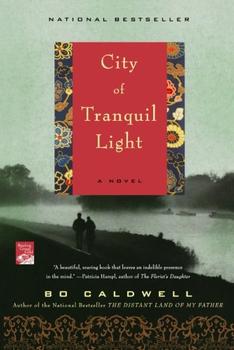Summary | Excerpt | Reading Guide | Reviews | Beyond the Book | Readalikes | Genres & Themes | Author Bio

A Novel
by Bo Caldwell
The missionary was from India and he said he was returning there the following month, which I found startling, for he was old and frail. He told our class that in foreign lands the need for those to share the Good News and to care for people's bodies and souls was great, and that a missionary could be a doctor in the mission field as long as he had a good strong brush and plenty of soap and water. "A missionary brings light to the darkness," he said. "We are called to go where there is little light, and where there are people in need of help."
It seemed he was speaking directly to me; my face grew hot and I felt a pull somewhere inside. At the end of class when the offering was taken, I gave all I had - the quarter I had earned for work on the farm, plus six pennies.
At that time, I had not yet been baptized. As Mennonites we believed that faith comes not as an inheritance but as a personal decision; it is a gift freely offered and up to each individual to accept. My parents worked hard to help their children be ready to receive that gift; my mother knelt and prayed with us each morning, and in the evening my father read to us from Scripture. I was taught that faith should be apparent in every area of one's life, and I saw evidence of my parents' faith in their actions. They shared what they had with those who had less, they never turned a stranger away, and they showed me that loving our neighbor often meant feeding and clothing him, even if that involved less comfort for us. These things were as much a given in our home as taking your hat off when you were spoken to.
While faith was not my inheritance, it was my heritage. My German ancestors were people who lived apart from the world and much to themselves in Prussia, preferring not to unite with the state and its church. They wanted no part in government affairs and refused to take up firearms, for doing so would violate the commandment Thou shalt not kill. Czarina Catherine II of Russia, hearing that the community was skilled in building dikes, offered its members a deal: she would give them large tracts of virgin farmland in Polish Russia and the freedom to practice their beliefs, in return for which the people would improve the land.
Mennonites believe in the dignity of labor, and they accepted Catherine's offer. Six thousand souls left Prussia for Polish Russia, where they built their own churches and schools and were exempted from military service. They were allowed to substitute an affirmation for an oath - swearing of any kind was forbidden by God - and they were allowed to bury their own dead. They began to work the swampland along the Vistula River, where they built dikes high enough to keep the river's overflow from the lowlands, eventually transforming vast expanses of swampland into thousands of acres of wheat. They continued to speak German and they thrived for many years.
Until 1873, when Alexander II, Catherine's great-grandson, revoked their special privileges, causing the community to look once more for a place where they would be free of the demands of an aristocratic government. The United States seemed to be the answer; its Constitution promised equal rights to all, and Congress had passed a bill that excused conscientious objectors from bearing arms. The community sent a delegation to America to spy out the land, and they returned with good news: fertile farmland could be had for very little, and the state of Kansas exempted Mennonites from military service. The Santa Fe railroad sent an agent to Russia to offer free transportation on a chartered steamer.
Thus in October of 1874, after selling their land for a fraction of its value, it was to America that everyone went. With their families and friends, my parents traveled by rail to Antwerp and from there to New York on the Netherland. The group settled in Kansas, but my parents soon found that their one-hundred-and-sixty-acre farm was too small to support a family of six. In 1885, the year I was born, they traveled to the western part of Oklahoma territory and leased a section of land that had never been cultivated.
Excerpted from City of Tranquil Light by Bo Caldwell. Copyright © 2010 by Bo Caldwell. Excerpted by permission of Henry Holt and Company. All rights reserved. No part of this excerpt may be reproduced or reprinted without permission in writing from the publisher.
You can lead a man to Congress, but you can't make him think.
Click Here to find out who said this, as well as discovering other famous literary quotes!
Your guide toexceptional books
BookBrowse seeks out and recommends the best in contemporary fiction and nonfiction—books that not only engage and entertain but also deepen our understanding of ourselves and the world around us.